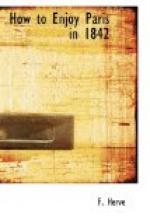The passport is a grievance which is much complained of by Englishmen, and certainly it does appear an infraction on liberty, that it should not be possible to go from one part of the country to another, without having to obtain permission; but it has other advantages: a criminal in France can very seldom escape; by the regulations of the police it is almost impossible for them to evade detection, as wherever he sleeps his passport must be produced, and every master or mistress of every description of lodging-house is bound to give an account of whatever stranger sleeps under their roof, to the police, and their officers; or the gendarmes, are authorised to demand the sight of the passport of any person whom they may suspect. In England a passport is not so necessary, because being an island the means of escape are not so easy, as they must either embark at some port or they must hire a boat on their own account, or enter into some proceeding which leads to discovery; and notwithstanding those obstacles to leaving the country, and the extreme vigilance of our police, felons do very often escape, and murders remain undiscovered, as those of Mr. Westwood, Eliza Greenwood, and many others. But those who are invested with authority in France sustain it with a more courteous demeanour than is the case in England, consequently it is less offensive. If your passport be asked for, it is in a polite manner, whereas with the English, give the butcher or the blacksmith the staff of office as constable, and he exercises his brief authority very frequently in a manner which is not the most engaging. Although a politesse and refinement of expression united with a smutted face, tucked-up sleeves, an apron and rough coarse hands, has something in it of the ludicrous, yet it softens the brutality to which uncultivated human nature is ever prone, but instances of such inconsistencies sometimes occur which cannot otherwise than excite a smile; a few days since a working man dropped a knife, a dirty looking boy of about 12 years of age picked it up, and presented it to the owner, with some degree of grace, saying, “Render unto Caesar that which is Caesar’s.” Passing through the Rue des Arcis, which is a mean narrow street, at one of the lowest descriptions of wine-houses where dancing was going forward, perhaps amongst fishwomen and scavengers, I noticed a large lantern hanging out over the door, upon which was inscribed, “Bal seduisant, le Paradis des Dames,” which may be translated, “Seductive Ball, the Paradise of Ladies.” The traveller may remark on the road from Boulogne to Paris and within a few leagues of the latter, in a small village at a house little better than a hut, where the insignia of a barber is displayed, a board on which is written; “Ici on embellit la nature,” or “Here we embellish nature.”




